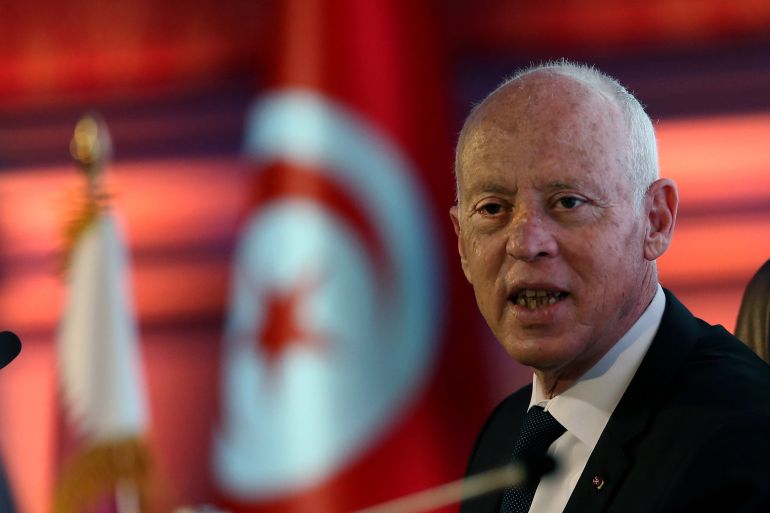Tunisia: Kais Saied’s anti-corruption war off to a slow start
The president fired the PM and suspended Parliament promising a major overhaul but but has made no significant moves.

Tunis, Tunisia – President Kais Saied’s long-promised war on corruption is not quite the dramatic blank slate that his followers have been hoping for.
On Sunday, Saied took control of the country by invoking Article 80 of the Tunisian constitution in a popular move to break the country out of the crisis brought on through political instability and economic fragility, all compounded by the coronavirus pandemic.
Keep reading
list of 3 itemsTunisia’s Ennahda calls for dialogue to resolve political crisis
Tunisia’s Trumpian president
Following his announcement, the president swiftly sacked Prime Minister Hichem Mechichi and other ministers, promising sweeping changes to the political system and to root out corrupt politicians.
His bold declarations were greeted with raucous street celebrations throughout the country on Sunday night.
After emptying the parliament building and ordering the army to refuse entry to the assembly speaker, Ennahdha party leader Rachid Ghannouchi, he extended curfews and imposed restrictions on groups of more than three people. He also banned politicians and dignitaries from leaving the country.
Since then, the country has fallen into an eerie silence.
Almost three days on from his initial declaration of exceptional circumstances and taking control of the country into his own hands, Saied has failed to appoint an acting first minister, and the promised war on corruption against politicians and Tunisia’s business elite is significantly less dramatic than previously imagined.
No politicians or businessmen have been arrested so far. Instead, a handful of investigations into political figures and parties have been announced in the press.
Spokesperson for the Court of the First Instances told Al Jazeera, “On July 14th this year, the judge of instruction for the Judicial Pole for Financial Crime opened an investigation into the financing of the electoral campaigns by three political parties.”
Those parties include the Muslim democratic party Ennahdha – which holds a plurality in parliament; the party, Qalb Tounes – led by media tycoon Nabil Karoui, and the minority party Aych Tounes that failed to win any seats in the election.
Karoui was only recently released from prison under investigation for allegations of fraud.
No probe
iWatch, a Tunisian association focused on investigating corruption and which had teams of specially trained observers working across the country during the 2019 legislative and presidential elections, expressed dismay that it has taken so long for the Judicial Pole for Financial crime to open investigations into issues of electoral finance fraud.
“We submitted our report at the end of the elections and we made recommendations to the court to open investigations back in 2019, [but no judicial investigations were opened]”, iWatch legal adviser, Tasnim Tayari, told Al Jazeera.
“Recently, we pushed for the files to be opened and only now are the financial courts beginning to open cases,” he said.
Sayida Ounissi, a politician from Ennahdha, told Al Jazeera that her party has been aware of the process of investigation by the Accounting Court since the end of the elections.
The Le Court de Compte was given the initial charge to analyse the financial transactions by parties involved in the 2019 elections.
The court analysed the transactions of all the parties involved and had issued warnings to a large number of parties, including Abir Moussi’s Popular Desotourian Party (PDL), Qalb Tounes and Ennahdha.
“The final report [on financial transactions made by the parties in the polls] was concluded in January of this year and it is only now that the second step, the Judicial Pole of Financial Crime, is instigating investigations and prosecutions,” Ounissi said.
She stressed that they had been transparent in all their campaigns with the High Independent Authority for Elections (ISIE). “Our accounts are transparent and have been examined by ISIE. All our overseas lobbying and media interactions [during the campaign] were completely legal,” she said.
Oussama Aouidit, member of the executive bureau of left-wing party Echaab, which supported Saied’s campaign in the 2019 presidential elections, vehemently defended the president’s actions, “July 25th saw the start of a new chapter in the history of Tunisia and Article 80 has given the president permission to manage this situation.”
Rampant corruption
Aouidit voiced the opinion that the political system that was created after the 2011 popular revolution that overthrew longtime President Zine Abedine Ben Ali has allowed widespread corruption throughout all of Tunisian society.
“It is not enough just to open the files on one or two parties, we need to open all the cases of corruption to investigation,” he said.
Amel Wertatani, a legal expert and member of parliament for Qalb Tounes, told Al Jazeera, “As a jurist, I know we have to wait for the results of the investigation by the court, but I weep for my country.”
“It is not a case of a person or party it is the system. You can’t just place someone in prison, you have to address the root causes and singular investigations cannot address the mechanism of corruption within the political system,” she said.
Amine Snoussi, Tunisian political analyst and author of two books on Tunisia’s recent political history, agreed that the anti-corruption campaign needed to be extensive, telling Al Jazeera that the investigations had to go right across the board, including looking at the president himself.
“I hope they investigate him, too.”
Snoussi referred to the report that, on March 10, the Achaab Yourid party approached the Judicial Pole for Financial Crime, seeking an investigation into the financing of the president’s campaign. However, he said, no investigation has begun to date.
Snoussi stressed the urgent need for change in the whole electoral law and system, “In Tunisia, everyone goes into a campaign first and then looks for money, so it is easy for foreign actors to offer money and too hard to refuse that money.”